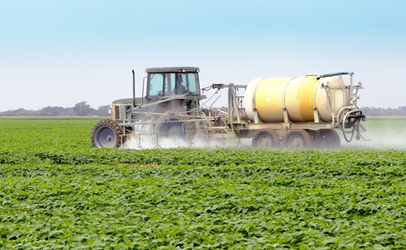 ment of Agriculture recently posted the latest data from the Pesticide Data Program (PDP) annual summary and, as in previous years, the agency found that, “U.S. food does not pose a safety concern based upon pesticide residues.”
ment of Agriculture recently posted the latest data from the Pesticide Data Program (PDP) annual summary and, as in previous years, the agency found that, “U.S. food does not pose a safety concern based upon pesticide residues.”“This is continuing evidence that fruits and vegetables for sale in the United States are exceedingly safe,” Marilyn Dolan, executive director of the Alliance for Food and Farming, said of the 2012 report.
Each year, USDA and the Environmental Protection Agency (EPA) work together to identify foods to be tested on a rotating basis, focusing on “commodities highly consumed by infants and children.” In 2012, surveys were conducted on a variety of foods, including fresh and processed fruits and vegetables, wheat, butter, and water.
More than 99 percent of the products sampled through PDP had residues below the EPA tolerances. Residues above the tolerance levels were detected in 0.53 percent of the samples. In analyzing the data, the Environmental Working Group (EWG) noted that there were 63 tolerance violations, which included methamidiphos and acephate residues on 24 samples of cherry tomatoes and 32 samples of snap peas.
But EPA determined that, “the extremely low levels of those residues are not a food safety risk, and the presence of such residues does not pose a safety concern.”
What to Eat
Dolan told Food Safety News that she is frustrated when such reports don’t generate much attention. It’s reports like the EWG’s Dirty Dozen that get noticed, she said, adding that the upcoming version of the Dirty Dozen list “will tell consumers the exact opposite of what’s in this report.”
Concerned about how pesticide exposure negatively impacts neurodevelopment and behavior, groups such as EWG encourage parents to give their children organic fruits and vegetables. The Dirty Dozen list is meant to help parents avoid the 12 “most contaminated fruits and vegetables.”
A 2012 report on various routes of pesticide exposure from the American Academy of Pediatrics noted that “dietary modifications can help reduce pesticide exposure” and that “consumption of organic food may lower pesticide exposure.”
However, Dolan said that following EWG’s guidelines for buying organic produce makes increasing our fruit and vegetable intake more difficult and more expensive.
Tolerance Concerns
“It’s true that most samples meet legal limits every year, but legal doesn’t always mean safe,” argues EWG senior analyst Sonya Lunder.
The EPA’s pesticide tolerances are meant to keep track of whether farmers are applying pesticides properly – not too late in the season or in amounts above what’s allowed – Lunder said.
“I see no reason to regard the EPA’s exposure limits as the final word on pesticide safety,” Dr. Andrew Weil told Alex Formuzis, EWG’s vice president for media affairs, in a blogged response to a recent Slate column arguing for conventionally grown fruits and vegetables over organic versions.
EWG believes these tolerance levels are not set to protect children eating produce and, if they were the standard, more fruits and vegetables would fail.
“Some liken pesticide tolerances to a 500-mph speed limit,” Lunder said. “It is too easy to comply and does not guarantee anyone’s safety.”
EPA states that data from the PDP are used to enhance its programs for food safety and help evaluate dietary exposure to pesticides. “The Pesticide Data Program provides reliable data through rigorous sampling that helps assure consumers that the produce they feed their families is safe,” reads an EPA statement.
Regardless of whether it’s organically or conventionally grown, everyone should be eating more fruits and vegetables. Even EWG points out that “eating conventionally-grown produce is far better than not eating fruits and vegetables at all.”
And, no matter which choice consumers make, it’s important to remember to wash produce to reduce or eliminate residues. The U.S. Food and Drug Administration recommends that people wash fruits and vegetables with large amounts of cold or warm tap water, scrub them with a brush if it’s appropriate, and not use soap.





